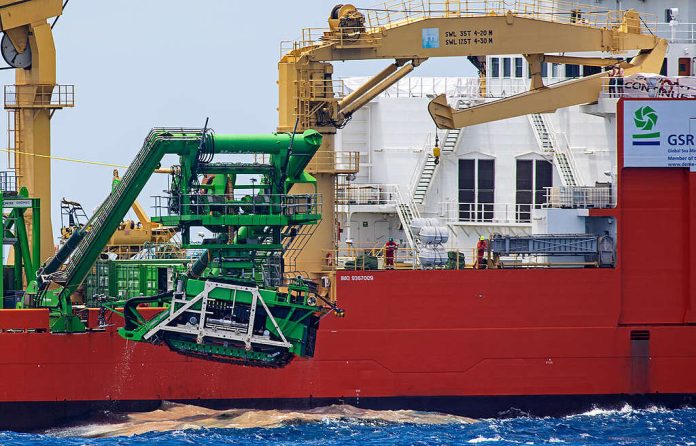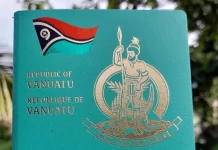The head of a Canadian deep-sea mining company start-up says he wants to wait for regulations to be in place before starting “commercial-scale nodule collection” after the International Seabed Authority agreed more time was needed to develop the mining code.
The Metals Company wants to mine in the Clarion-Clipperton Zone in the Pacific.
The ISA finished meeting in Kingston Jamaica on Friday, where member states discussed the rules and procedures of exploitation – the actual mining – which has not yet started.
Member states agreed that no deep-sea mining code would be adopted, and discussions would instead continue in November and the first half of 2024.
The Metals Company chief executive Gerard Barron said it was “now a question of when – rather than if – commercial-scale nodule collection will begin”.
To the disappointment of environmental advocacy groups, like Greenpeace, the two-year rule still exists. This is a provision under the United Nations Convention on the Law of the Sea that once triggered means if regulations are not adopted within two years, mining licenses could be granted under whatever rules exist.
Nauru triggered the rule in 2021 that lapsed on July 9 of this year. It means The Metals Company can apply to mine under its subsidiary Nauru Ocean Resources and the ISA would have to consider the application.
A statement from The Metals Company said: “Nauru Ocean Resources Inc. (NORI), reiterated its preference to submit an application for a plan of work for exploitation once these RRPs (rules, regulations and procedures) are in place.
“However, consistent with NORI’s sponsoring state Nauru’s rights under UNCLOS (United Nations Convention on the Law of the Sea), and as was reaffirmed in Friday’s decision, NORI reserves its right to submit an application for a plan of work in the absence of the adoption of the RRPs.”
Greenpeace campaigner James Hita said he was worried, despite The Metals Company’s preference to wait for the mining code to be completed.
“They’re trying to manipulate the system to make it work in their favour,” Hita said.
“They’re trying to push for regulations to be completed sooner than they should be, they’re trying to push for deep sea mining to go ahead…they can’t make any profit until they begin.”
The Pacific Network on Globalisation’s (PANG)deep-sea mining spokesperson Joey Tau said there was a strong push from environmental groups who were opposing the adoption of regulations.
“We need more time; we need more science to better inform these regulations if we are to move forward.”
Tau said the “gate is now open” to mine with the two-year rule still in place.
“That’s why we’re calling that no application of scope of work should be approved by the ISA and the assembly should vote for a moratorium or precautionary pause.”
However, The Metals Company environmental manager Dr Michael Clarke said NGOs like Greenpeace have made their position on a lack of data.
“It always amazes me on how you can take such a forceful position when the data hasn’t been collected yet, when you’re not fully over the data and you haven’t fully investigated the claims that you’re making,” he said.
Clarke said The Metals Company had spent about US$120 million on data collection in the Clarion-Clipperton Zone over the last 10 years.
He said the company was coming to the end of its collection period and was almost ready to submit an impact assessment to the ISA.
Clarke added a moratorium “makes no sense” because it would result in contractors doing less exploration work and less data being collected.
The list of countries calling for at least some sort of pause on deep-sea mining grew this month to over 20, with Ireland and Canada being added to the list.
Gerard Barron said countries calling for a pause “introduced a degree of political uncertainty around the timing of the adoption of the Mining Code”.
But the uncertainty was reduced when the council agreed to a roadmap for exploitation rules, he said.
“We are obviously disappointed that the ISA failed to adopt RRPs by 9 July 2023 as we hoped two years ago,” Barron said.
“But we also recognise that the vast majority of Member States worked very hard in the last 24 months and demonstrated strong continued commitment to finalising the Mining Code.
“I believe the finish line is now within sight and we look forward to the consolidated regulatory text at the next meeting in November.”
Meanwhile, seven non-governmental organisations, including the Pacific Network on Globalisation (PANG), are calling for increased media access at ISA meetings.
In a letter, the NGOs urged the ISA to ensure it accredits the media to attend its meetings alongside removing a clause that stops media criticising the authority or its member states.
Tau said the rules were continuously changing for media accreditation.
“What aspects of the proceedings that journalists are able to observe and cover and which are not, that’s why we are calling for the transparency of the secretariat,” he said.
SOURCE@ RNZ PACIFIC/PACNEWS















